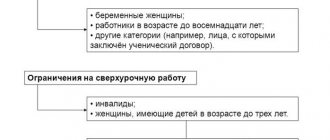Article 99 of the Labor Code of the Russian Federation continues the theme of Chapter 15 of Section IV of the Labor Code of the Russian Federation regarding legislative definitions of working time and its various types.
So, in Art. 99 of the Labor Code of the Russian Federation we are talking about overtime work, that is, work that goes beyond the working hours established by law or an employment contract. Labor Code of the Russian Federation
dated December 30, 2001 N 197-FZ
Full text of the article, guides, additional information - in ConsultantPlus
What is overtime work?
Each enterprise has a certain working regime, which provides for the duration of work and rest. It is reflected in internal regulations. The length of the working day is strictly regulated by the labor protection law, and the timing of work shifts is also determined. Sometimes a general record of working hours is kept, accumulated over a week or month. Any work beyond these limits, initiated by the employer, is called overtime .
The Labor Code of the Russian Federation talks about the nuances of exceeding the established temporary work standards in Art. 99, and remuneration for such work is paid in accordance with Art. 152.
How to pay for overtime work on weekends and holidays ?
Payment
Regardless of whether the employer has followed or failed to comply with the procedure for engaging in overtime work and recording overtime work, the employee has the right to demand appropriate payment for hours worked in excess of the norm.
Payment is made:
- at least time and a half for the first two overtime hours worked;
- minimum double for hours over two.
In accordance with Art. 152 of the Labor Code of the Russian Federation, an employee, at his own request, has the right to request additional rest instead of payment.
What additional work is not overtime?
An important nuance is that the initiative for overtime work must come from the employer. If a particularly zealous employee decides to stay at his favorite job of his own free will, his additional work will not be taken into account and paid according to the legal requirements for overtime work (Rostrud Letter No. 658-6-0 dated March 18, 2008).
Question: Is payment for overtime work and work on weekends and holidays in amounts exceeding those established by the Labor Code of the Russian Federation (clause 3 of Article 255 of the Tax Code of the Russian Federation) recognized as an expense for income tax purposes? View answer
Work performed during irregular working hours is not recognized as overtime.
IMPORTANT! Overtime work cannot be a permanent practice at the enterprise; it can be resorted to only if necessary and from time to time.
Commentary on Article 99 of the Labor Code of the Russian Federation
Overtime work is work performed by an employee at the initiative of the employer outside the established working hours, daily work (shift), as well as work in excess of the normal number of working hours during the accounting period.
When recording working hours by the day, work beyond the established duration of the working day is considered overtime.
In the case of cumulative accounting, overtime will be considered work in excess of the established duration of the work shift.
Usually, an order is issued regarding the performance of overtime work, which stipulates the reasons why it is necessary and the categories of workers involved in the work. However, if such an order was not issued, but there was a verbal order from one of the administration representatives, then the work is considered overtime.
Overtime work is recognized in practice even when it was carried out not only with the knowledge of the employer, but also of the immediate supervisor of the work (foreman, site manager, etc.). However, in all cases, involvement in overtime work is possible only with the written consent of the employee.
Work is considered overtime regardless of whether it was part of the employee’s duties or not.
Overtime work is not considered to be work in which the actual duration of daily work on certain days may not coincide with the duration of the scheduled shift.
Overtime work beyond the established duration of the working day is not recognized when working the standard hours with a flexible work schedule, which will be discussed in the section on working hours.
Work beyond the stipulated working hours of employees with irregular working hours, if it is compensated by additional leave of more than 28 calendar days, is not considered overtime.
Overtime work during vacation hours without pay is not considered, as well as work performed part-time (in excess of the established duration of working hours), work performed by an employee beyond the time stipulated by the employment contract, but within the established duration of the working day (shift), working part-time (Resolution of the Plenum of the Supreme Court of November 24, 1978 No. 10 “On the application by courts of legislation regulating the remuneration of workers and employees”).
Work in the order of combining professions (positions) does not apply to overtime (Article 151 of the Labor Code of the Russian Federation).
Work under civil law contracts (for example, assignments, paid services, contracts, etc.), carried out in free time from work, does not apply to overtime.
Involvement in overtime work is carried out by the employer with the written consent of the employee and does not require permission from the representative body of employees in the following cases established by Article 99 of the Labor Code of the Russian Federation:
1) if necessary, perform (finish) work that has begun, which, due to an unforeseen delay due to technical production conditions, could not be performed (finished) during the working hours established for the employee, if failure to perform (non-complete) this work may lead to damage or destruction of property the employer (including the property of third parties located at the employer, if the employer is responsible for the safety of this property), state or municipal property, or create a threat to the life and health of people;
2) when carrying out temporary work on the repair and restoration of mechanisms or structures in cases where their malfunction may cause the cessation of work for a significant number of workers;
3) to continue work if the replacement employee fails to appear, if the work does not allow a break. In these cases, the employer is obliged to immediately take measures to replace the shift worker with another employee.
An employer’s involvement of an employee in overtime work without his consent is permitted in the following cases:
1) when carrying out work necessary to prevent a catastrophe, industrial accident or eliminate the consequences of a catastrophe, industrial accident or natural disaster;
2) when carrying out socially necessary work to eliminate unforeseen circumstances that disrupt the normal functioning of water supply, gas supply, heating, lighting, sewerage, transport, and communications systems;
3) when performing work the need for which is due to the introduction of a state of emergency or martial law, as well as urgent work in emergency circumstances, that is, in the event of a disaster or threat of disaster (fires, floods, famine, earthquakes, epidemics or epizootics) and in other cases, threatening the life or normal living conditions of the entire population or part of it.
In other cases, involvement in overtime work is permitted with the written consent of the employee and taking into account the opinion of the elected body of the primary trade union organization.
Pregnant women, workers under the age of eighteen, and other categories of workers are not allowed to work overtime in accordance with this Code and other federal laws. Involvement of disabled people and women with children under three years of age in overtime work is allowed only with their written consent and provided that this is not prohibited for them due to health reasons in accordance with a medical report issued in the manner established by federal laws and other regulations legal acts of the Russian Federation. At the same time, disabled people and women with children under three years of age must be informed of their right to refuse overtime work upon signature.
These guarantees also apply to employees with disabled children under the age of 18; workers caring for sick members of their families in accordance with a medical report (Part 2 of Article 259 of the Labor Code of the Russian Federation); fathers raising children of the corresponding age without a mother, and guardians (trustees) of minors (Article 264 of the Labor Code of the Russian Federation).
The duration of overtime work should not exceed 4 hours for each employee for two consecutive days and 120 hours per year.
The employer is required to ensure that each employee's overtime hours are accurately recorded.
In other cases, in addition to those specified in Article 99 of the Labor Code of the Russian Federation, involvement in overtime work is allowed in addition to the written consent of the employee, taking into account the opinion of the representative body of employees. That is, the Labor Code of the Russian Federation establishes a double guarantee against the unreasonable involvement of workers in overtime work.
For a certain category of workers, there is a direct ban on being involved in overtime work.
Very often, overtime work is confused with the so-called “irregular working hours”. The latter is a condition of an employment contract concluded with certain categories of workers (usually managers, specialists) and consists in the fact that on certain days, if there is a production need, these workers can be involved in work beyond the working day (shift).
For each individual employee (and not on average for all persons involved in overtime work, not for the organization as a whole), overtime work cannot last more than 120 hours per year and 4 hours for two days in a row.
In some cases, certain regulations allow higher overtime limits. This applies, for example, to railway workers, subway workers, some categories of drivers, forestry workers, etc. In these cases, the rules of special legal acts apply.
For example, paragraph 5 of the Regulations on the peculiarities of working hours and rest time for communication workers with a special nature of work dated September 8, 2003 N 112 states that the use of overtime work is allowed in cases provided for in Article 99 of the Labor Code of the Russian Federation, as well as in the following exceptional cases:
1) when carrying out urgent work to eliminate accidents on communication lines and station equipment;
2) when carrying out work on the transportation and delivery of mail and periodicals in cases of delay of railway, air, sea, river and road transport or untimely submission of periodicals by publishing houses;
3) when processing increased telephone, telegraph and postal exchanges on the eve of holidays;
4) when processing orders for periodicals during the subscription campaign;
5) in case of unscheduled delivery of pensions.
Involvement in overtime work in these exceptional cases is permitted with the written consent of the employee and taking into account the opinion of the elected trade union body of the organization.
The Labor Code of the Russian Federation provides for a special procedure for paying overtime work. Article 152 of the Labor Code of the Russian Federation regulates the issue of remuneration for workers involved in overtime work in the prescribed manner. Applying the rules of Article 152 of the Labor Code of the Russian Federation, it should be noted that currently:
1) differences in remuneration for workers involved in overtime work have been eliminated, depending on whether the employee works on the basis of a time-based wage system or works on a piecework basis;
2) specific amounts of remuneration for overtime work can be determined in a collective agreement or in an employment contract.
In all cases, for the first 2 hours of overtime work, the employee is now paid no less than one and a half times the amount, and for subsequent hours - no less than double the amount. In other words, the rigidly centrally established upper limits of surcharges for overtime work have been abolished. You cannot pay less than the limits established in Article 152 of the Labor Code of the Russian Federation, but you can pay more.
In addition, it is now possible not only to provide time off for overtime work, but also to add days off to annual leave, releasing the employee from work on other days for the number of hours for which the employee was involved in overtime work.
Permission required!
In order for an employee to work longer than required by the established work schedule or shift duration, or to exceed the total number of hours during the pay period, the employer must first seek consent to this. Before you think about involving your subordinates in overtime work, you should obtain permission from:
- a trade union organization that protects workers' rights, or a representative of this body;
- the employee himself in writing.
Question: Are payments for overtime work, the duration of which exceeds 120 hours per year, included in expenses for income tax purposes (clause 3 of Article 255 of the Tax Code of the Russian Federation)? View answer
Cumulative duration of time
As you know, not all organizations conduct the same type of activity, and there is a whole list of professions that require a special work schedule .
For example, for such professions as librarian, office worker, salesperson, real estate consultant, as well as some other similar types of activity, it is quite easy for the employer to establish the exact number of hours per shift.
Thus, if an employee works on a six-day schedule, then given the fact that the maximum amount of working time per week is 40 hours , the duration of his shift should be no more than six and a half hours.
However, there are also professions whose type of activity does not allow introducing clear limits for the duration of one work shift for workers. These include people working as security guards, firefighters, police officers, doctors, and so on.
This category of people works under irregular hours and it is for them that the concept of summarized calculation of working time is adopted.
If the total number of hours worked overtime by an employee is calculated not over a weekly period, but over a slightly longer period, then this method of recording overtime hours is called summed.
However, the number of overtime hours must comply with the standards established by law. It is necessary to establish summarized accounting using certain documents.
The employer is obliged to draw up in writing a document setting out the conditions of overtime work , its duration, schedule, as well as the duration of the accounting period for which hours worked in excess of the norm are calculated.
Reasons to work extra
The employer does not have the right to simply ask an employee to stay at work and work overtime. Special time is stipulated for work in the Labor Code, employment contract and other legislative acts, and no one is allowed to violate this regime without reason. However, from time to time unforeseen events or special circumstances occur when overtime work becomes necessary. The law provides for the following reasons that may force an employer to introduce overtime work:
- when the work was not completed during the working day due to technical reasons or force majeure, and it is necessary to complete it in order to avoid potential property damage or a threat to health or life;
- if overtime work is a temporary “emergency emergency” associated with the repair or installation of equipment, without which a large number of people will not be able to perform their duties;
- there cannot be any interruptions in the work, and the next shift worker does not show up on time: he must be immediately replaced by another competent worker, even if his shift has already come to an end.
Let them work if doctors allow them
Some categories of workers, even if they agree to work overtime, cannot be involved in it without a positive medical report. Order of the Ministry of Health and Social Development of Russia No. 411n dated May 2, 2012 requires that a certificate of no contraindications to additional work for health reasons be issued to:
- disabled workers at the enterprise;
- working mothers of children under 3 years old.
IMPORTANT! In addition to the authorizing medical document and consent, these categories of employees are required to confirm in the form of a handwritten signature that they are aware of the right to refuse to work overtime.
Exceeding temporary standards - under no circumstances!
The law defines those employees who, under no circumstances, can be involved in additional workload. Even with consent, you cannot ask or oblige to work overtime:
- women expecting a child;
- subordinates for whom an apprenticeship contract is currently in effect;
- persons who have not yet turned 18 years of age;
- other categories of workers for whom such a restriction is determined by federal laws and the Labor Code of the Russian Federation.
EXCEPTION! It is permissible for minor employees to remain at work beyond the time limit if they:
- belong to creative professions;
- work in the media sector;
- appear on television;
- engaged in a play, circus performance, show;
- participate in the exhibition of any works.
These types of activities are enshrined in the list of professions and positions approved by Decree of the Government of the Russian Federation No. 252 of April 28, 2007.
Overtime shortened
The law provides for certain categories of jobs for which the working day is shorter than that of all other workers. This is not a reduction, but a norm. In this case, if such employees work overtime, such work will be considered to be in excess of this particular norm (Article 92 of the Labor Code of the Russian Federation). These categories include:
- employed under 18 years of age (depending on age, they can be employed 24-35 hours a week);
- disabled workers of groups 1 and 2 – can work up to 35 hours a week;
- employees in hazardous work of degrees 3 and 4 (according to the assessment of special working conditions) – up to 36 hours a week;
- women working in the Far North;
- teachers and doctors (Articles 333, 350 of the Labor Code of the Russian Federation).
When you can't refuse overtime
In Art. 99 of the Labor Code of the Russian Federation lists circumstances that do not require the consent of subordinates to work beyond time limits. When the unexpected happens, you need to act quickly and consistently, regardless of time: this is the responsibility of every employee. You need to do everything in your power without looking at your watch in the following situations:
- eliminating the results of man-made disasters, industrial accidents, and the consequences of rampant natural disasters;
- performing actions designed to prevent an emergency;
- when an accident occurred with socially necessary communications, such as communications, transport, water supply, heating, gas, electricity, etc.;
- it is necessary to act immediately due to the declaration of a state of emergency or martial law;
- something happened that endangered life and health or created abnormal living conditions for a significant part of the population (hunger, natural disasters, epidemics, animal attacks, and other similar situations).
Details of the procedure for attracting overtime work
So, this is done with the written consent of the employee, but permission from the representative body of employees is not required in certain cases established by the article in question:
- when there is a need to perform work that, due to some problems, could not be completed within the established working hours, if failure to complete the work may result in damage or destruction of the employer’s property, state or municipal property, or create a threat to the life and health of people;
- when carrying out temporary work, when a malfunction of mechanisms or buildings may cause the cessation of work for a significant number of workers;
- to continue work in the absence of a shift worker, if the work does not allow a break.
His involvement in overtime work does not depend on the consent of the employee in the case of work carried out:
- necessary to prevent a catastrophe, accident or eliminate the consequences of a man-made accident or natural disaster;
- to eliminate circumstances that impede the normal operation of water supply, gas supply and all similar systems of public importance;
- the need for which is associated with the introduction of a state of emergency or martial law and the like.
For all other reasons, involvement in overtime work is possible only with the written consent of the employee and taking into account the position of the elected body of the primary trade union organization.
In any case, it is prohibited to employ pregnant women, as well as persons under 18 years of age, to work outside the working hours. Disabled people and mothers with children under three years old can be involved in overtime work, but only with their written consent and if this is not prohibited by doctors due to the health status of such workers.
Such categories must be separately informed by signature of their right to refuse to work outside the labor schedule.
The total duration of overtime work cannot exceed 4 hours over two consecutive days and 120 hours per year for each employee.
It is the employer's responsibility to ensure that everyone's overtime hours are accurately recorded.
The Labor Code of the Russian Federation establishes a double guarantee against the unreasonable involvement of workers in overtime work. It is expressed in the fact that the signature of the employee himself is not enough. If there are no circumstances related to the need to eliminate some threat and listed above, then the opinion of the representative body of workers is also needed.
It should be noted that the unreasonable involvement of employees in overtime work is actually not liked by everyone, and first of all, by the employers themselves. The point here is not about any sanctions in the event of revealing the illegality of using the opportunities provided by the article in question, but about the fact that they are paid at increased rates. And not paying is extremely difficult from all points of view. Therefore, with great enthusiasm, employers are leaning on the application of provisions on irregular working hours.
If at the very beginning of this century only special categories of workers had irregular working hours, now it has become so even for cleaners. At the same time, the absence of a clear time frame for irregular working hours is understood only in one direction: workers cannot come to the workplace a little later, but they are forced to stop the working day when the employer deems it necessary.
Overtime, but working
Despite the special situation, it is impossible to allow the employee’s health to be undermined by working beyond the established standards. A person cannot be forced to work additionally longer than 2 days in a row for 4 hours. During the year, such overtime hours should not exceed 120.
An employer must carefully calculate how many hours its employees have worked in excess. In the timesheet, which takes into account working hours, there is a special code for this type of work (letter “C” or digital “04”).
Price for additional labor
The amounts that are supposed to be paid to employees for their overtime work can be established by the employer and formalized by internal regulations. Of course, you cannot set them lower than required by law:
- for the first and second hour of overtime work - one and a half times the pay rate;
- over the subsequent time - doubled.
You can easily calculate your overtime hours using our overtime hours calculator.
If an overworked employee has such a desire, then instead of a financial reward, he will be able to receive additional rest for the time he worked beyond the norm, or even longer, if his superiors do not object.
FOR YOUR INFORMATION! If an employee has an employment contract for irregular working hours, he is not entitled to additional amounts, since such work is ensured by the provision of another leave.
If overtime payments are calculated based on the processing of total working hours for a weekly or monthly pay period, then the first two hours, which provide time and a half pay, are counted separately for each time period.
For example, if an employee worked 20 hours overtime during the week, he will be paid 7 x 2 = 14 hours at time and a half, and the remaining 6 hours at double.
Despite the fact that “overtime” is not a permanent type of payment, according to accounting documents it is considered part of the employees’ wages, therefore it is subject to personal income tax, and contributions to extra-budgetary funds are also paid from it.
Calculation of additional payments for piecework wages
When paying piecework, the procedure for calculating additional payments is established in a collective agreement with employees or in an individual employment contract with each specific employee.
The agreement may provide:
- payment for overtime hours at an increased rate, without taking into account the quantity of manufactured products and piece rates;
- additional payment is calculated based on a coefficient of 0.5 for the first two hours of overtime work and 1.0 (for subsequent hours of overtime work from the hourly tariff rate.
The employee's hourly wage rate is set in the company's staffing table.
Recommendations for employers on registering overtime work
- Do not forget to request the employee’s consent to work overtime and clarify the opinion of the trade union organization.
- Do not disregard the medical report if it prohibits such work.
- Reflect in the collective agreement and employment contracts the regime for attracting and paying overtime.
- Mark the schedule for involving workers in overtime in a special journal. Overtime per year should not exceed the legal 120 hours.
- Document all relations with the employee in writing: issue an order on overtime work, indicating the amount of compensation and overtime hours, and obtain written consent from the employee.
Legal restrictions
Work beyond the working time limit on the initiative of the employee cannot be considered overtime work. That is, only work performed by employees at the direction of the employer can be considered overtime work. It should be understood that the employer in this case means the highest official of an enterprise or organization. Accordingly, employees can go to work overtime only on the basis of an order from the manager.
Organizing overtime work on the initiative of mid-level management officials also cannot be considered as overtime and will be classified as work performed without the knowledge of the employer. This means that when an employee goes to work overtime, he or she must comply with the following procedure:
- obtaining the employee's written consent;
- issuing an order on overtime work.
The possibility of involving an employee in overtime work without his written consent exists within strictly limited limits by law. These frameworks are indicated in Part 3 of Art. 99 of the Labor Code of the Russian Federation, which defines cases in which the employee’s written consent is not required. These cases include certain emergency and extraordinary situations that can entail a threat to the life and health of citizens.
Thus, involvement in overtime work aimed at eliminating or preventing the consequences of accidents, disasters, natural disasters, or in work related to troubleshooting problems in the life support system, can be carried out on the initiative of the employer without the condition of obtaining the employee’s consent.
In accordance with Part 6 of Art. 99 of the Labor Code of the Russian Federation, the overtime work limit cannot exceed:
- 4 hours consecutively for two days;
- 120 hours throughout the year.








